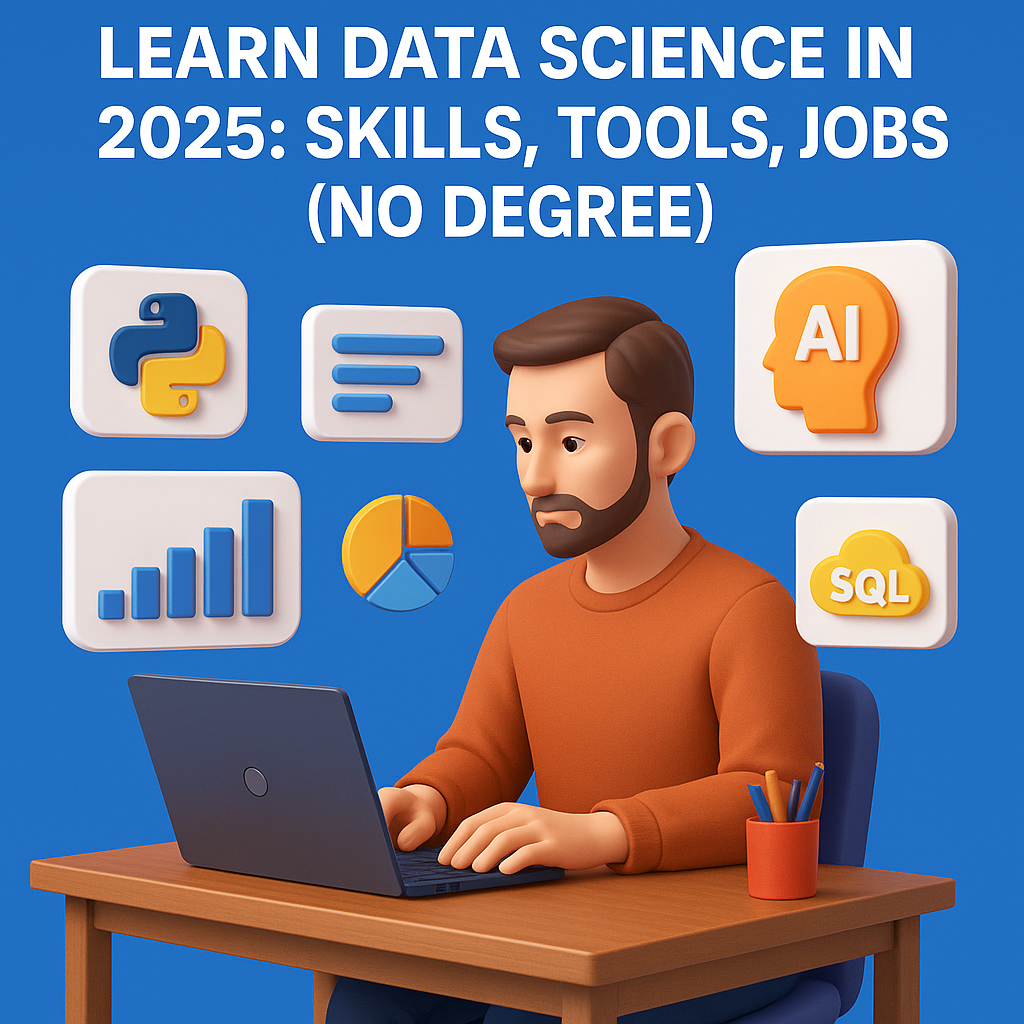In 2025, it’s easier than ever to start a career in data science. The need for qualified data professionals is greater than ever due to the growth of AI, analytics, and data-driven decision-making. The finest aspect? To begin, a conventional degree is not required.
-
Explosive Job Growth: The U.S. Bureau of Labor Statistics projects a 36% growth in data scientist employment from 2023 to 2033, significantly outpacing the average for all occupations. Bureau of Labor Statistics+1cobloom.com+1
-
Lucrative Salaries: Entry-level data scientists can expect to earn between $95,000 and $130,000 annually in 2025, with senior roles commanding upwards of $230,000. Refonte Learning
-
Diverse Industry Applications: Data science skills are in demand across various sectors, including technology, healthcare, finance, retail, and government, offering a wide range of career opportunities.
🎓 Succeeding Without a Traditional Degree
Breaking into data science without a formal degree is entirely feasible. Employers increasingly value practical skills, project experience, and certifications over academic credentials.
-
Skill-Based Hiring: Many organizations prioritize candidates with demonstrable skills and portfolios over those with traditional degrees.
-
Career Transitions: Individuals from non-technical backgrounds, such as finance, economics, or the arts, have successfully transitioned into data science roles by acquiring relevant skills and experience.
🧠 Essential Skills for Aspiring Data Scientists
To thrive in data science, focus on developing the following competencies:
-
Programming Languages: Proficiency in Python is crucial, given its versatility and extensive libraries. SQL is essential for database management, and R is beneficial for statistical analysis.
-
Machine Learning & AI: Understanding machine learning algorithms and frameworks like TensorFlow and PyTorch is vital. Familiarity with AutoML tools can expedite model development.
-
Data Visualization: Ability to create compelling visualizations using tools like Tableau, Power BI, and Matplotlib helps in communicating insights effectively.
-
Statistical Analysis: A solid grasp of statistics, including probability, linear algebra, and calculus, is necessary for data interpretation and model development.
-
Big Data Technologies: Knowledge of platforms like Hadoop and Spark is beneficial for handling large datasets.
Stay ahead by familiarizing yourself with these leading tools:
-
Python: A versatile language with extensive libraries for data analysis and machine learning.
-
TensorFlow & PyTorch: Popular frameworks for developing machine learning models.
-
AutoML Platforms: Tools like Google AutoML and H2O.ai enable automated model development, reducing the need for extensive coding.
-
Cloud Services: Platforms such as AWS SageMaker and Google Cloud AI Platform offer scalable solutions for data processing and model deployment.
-
Data Visualization Tools: Tableau and Power BI are widely used for creating interactive dashboards and visualizations.
📚 Learning Pathways Without a Degree
Embark on your data science journey through these avenues:
-
Self-Study: Utilize free resources like Khan Academy and YouTube, and enroll in paid courses on platforms like Coursera and Udemy to build foundational knowledge.
-
Bootcamps: Intensive programs such as Springboard’s Data Science Bootcamp offer structured learning, hands-on projects, and career support. Springboard
-
Certifications: Obtain industry-recognized certifications like the Google Data Analytics Professional Certificate or Microsoft Certified Data Scientist to validate your skills.Simplilearn.com
-
Project Experience: Engage in real-world projects and competitions on platforms like Kaggle to apply your skills and build a portfolio.Simplilearn.com
-
Community Engagement: Join online forums, attend webinars, and participate in local meetups to network and stay updated on industry trends.
⏳ Timeline to Competency
Achieving job readiness in data science typically takes 6–12 months, depending on your prior experience and the intensity of your study. Consistent practice and project work are key to developing proficiency.
💼 Career Outlook and Salary Expectations
-
Entry-Level Positions: Salaries range from $95,000 to $130,000 annually, depending on location and industry. Refonte Learning
-
Mid-Level Roles: Professionals with 3–5 years of experience can expect to earn between $130,000 and $175,000.
-
Senior-Level Opportunities: Experienced data scientists and specialists may command salaries exceeding $230,000, particularly in high-demand sectors.
📖 Success Story: Transitioning Without a STEM Background
Serhan Tanriverdi, originally from a non-technical field, successfully transitioned into data science by:
-
Completing online courses to build foundational knowledge.Coursera
-
Developing a portfolio of projects to demonstrate practical skills.
-
Networking through bootcamps and online communities.
His journey exemplifies that with dedication and the right resources, a career in data science is attainable without a traditional degree.
❓ Frequently Asked Questions
Q: Is it possible to secure a data science job without a degree?
A: Yes, many employers prioritize practical skills and project experience over formal education.
Q: What is the most important programming language to learn?
A: Python is highly recommended due to its versatility and widespread use in data science.
Q: Are certifications necessary?
A: While not mandatory, certifications can enhance your resume and demonstrate commitment to the field.
Q: How can I gain practical experience?
A: Engage in personal projects, participate in competitions like Kaggle, and contribute to open-source initiatives.
- How to Launch Baseball Merch & Earn While You Sleep - August 6, 2025
- 7 LinkedIn Hacks Every Baseball Pro Should Use in 2025 - August 5, 2025
- Grow a Baseball Newsletter: 7 Job Tips That Drive Subscribers - August 5, 2025

